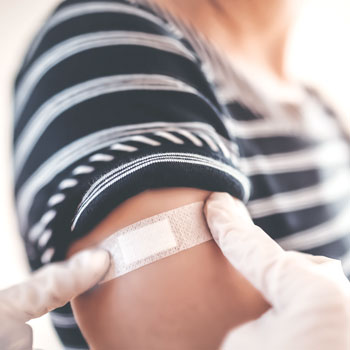ACP/Annals forum addresses adult vaccinations
Patient hesitation and physician uncertainty are two barriers to achieving optimal vaccination rates, according to expert panelists.
PCV20, PPSV23, RSV, mRNA. Experts dug into the alphabet soup of immunizations during ACP and Annals of Internal Medicine's latest virtual forum.
Their goal was to help internal medicine physicians get their patients up to date with the latest recommendations from another acronym—ACIP, the CDC's Advisory Committee on Immunization Practices.

"Adult vaccination rates in the U.S. are suboptimal, leaving individuals and in many cases also others in their communities at risk for preventable illness. … Many factors contribute to suboptimal vaccination rates, including failure to think of vaccines as routine components of adult health care, clinician confusion about the recommendations, and vaccine hesitancy among patients," said Christine Laine, MD, MPH, FACP.
Dr. Laine, Editor-in-Chief of Annals and a Senior Vice President at ACP, led off the Feb. 7 forum, which was also recorded and summarized in Annals. Janet Jokela, MD, MPH, MACP, served as a panelist and moderator.
"Patients look to us for trusted information about vaccines and vaccinations, and today's forum is an opportunity for all of us to learn," said Dr. Jokela, senior associate dean of engagement at the Carle Illinois College of Medicine at the University of Illinois Urbana-Champaign.
The challenges that make vaccination a critical topic for continual learning were apparent as the panel tackled a vignette about pneumococcal vaccination—a new patient with type 1 diabetes and asthma who thinks he may have gotten a pneumonia vaccine 20 years ago.
The patient's uncertainty about his vaccination history is the first problem, noted panelist Susan Lee, MD, FACP, professor of medicine at Renaissance School of Medicine at the State University of New York at Stony Brook.
"The other thing that makes it complicated is there's so many pneumonia vaccines, right?" she said. The current vaccination options include one polysaccharide vaccine, "good old PPSV-23 Pneumovax," but then multiple conjugate vaccines, with the two newer ones (PCV15 and PCV20) generally being preferred, Dr. Lee noted.
If the patient had definitely already received PPSV-23, the choice would be just a dose of PCV20, but given the uncertainty in this situation, PCV15 with PPSV-23 a year later might be best, the experts agreed.
"We really can't make assumptions when people don't know what they received. There is no harm in giving an additional dose. If somebody gets an extra dose, you might have a little more local reactogenicity. But other than that, you're going to get increased protection by giving the conjugate vaccine," said panelist Robert Hopkins Jr., MD, MACP, professor of internal medicine and pediatrics at the University of Arkansas in Little Rock.
To help physicians deal with such dilemmas, Dr. Lee recommends the PneumoRecs VaxAdvisor app, available on the web or for iOS or Android. "It's put up by the CDC and it's a really easy way to enter patient information and the clinical scenario to help you decide," she said.Pneumonia vaccination choices might also have to be guided by what is available, noted Dr. Hopkins. "The greatest challenge in this in 2024 to me is the formulary decision that we have to make for our offices: Are we going to go the PCV20 route or are we going to go the PCV 15 route? Those two options are equally good," he said.
The choices are not about to get easier soon either. "There are a number of other pneumococcal conjugate vaccines in the development pipeline, so don't expect the pneumococcal story to be settled in 2024," said Dr. Hopkins.
The experts moved on to one of the newest vaccines to come through the pipeline, the one for respiratory syncytial virus (RSV). "In June 2023, ACIP recommended that older adults, aged 60 years and older, may receive a single dose of RSV vaccine using shared clinical decision making," said Sybil Cineas, MD, FACP, associate professor of medicine, pediatrics, and medical science at Warren Alpert Medical School of Brown University in Providence, R.I.
Helping patients make decisions like this "is what we do in primary care," she added. "The decision should be based on discussion between you and the patient guided by their risk, the patient's characteristics, their values, and their preferences, as well as the characteristics of the vaccine." Patients' existing chronic conditions and their living situation (e.g., long-term care) are important considerations in whether to get the RSV vaccine, Dr. Cineas noted.
Age matters a lot, too, added Dr. Hopkins. "We know that incidence of RSV disease is greatest in those 60 and older but if you look at the data, particularly in the mid-70s, it really jumps up," he said.
An interesting aspect of the RSV vaccine rollout has been patient response to it, Dr. Lee noted. "I find that my patients are pretty enthusiastic about getting this vaccine, particularly if they have grandchildren who go to daycare centers," she said. "There's much less hesitancy to get this vaccine as opposed to the COVID vaccine, even though it is a novel vaccine."
Of course, no discussion of adult vaccines would be complete without the most familiar acronym, COVID-19. The panelists tackled a vignette about a 68-year-old patient who had never been vaccinated against COVID-19 but was interested in it now, after an infection two months ago.
"We would advise her to get a single dose of the current 23-24 COVID-19 vaccine at her earliest convenience, and ideally, give it to her in the office today to minimize inconvenience and any chance that she may get dissuaded," said Dr. Hopkins. "Unfortunately, the uptake of the bivalent vaccine last year and the current 23-24 vaccine in this country has been dismal."
He also shared what he would say to such a patient: "I'm so pleased that you want your COVID-19 vaccine. I strongly recommend it for you. I want you to have the same protection that all of my family have had and that I've encouraged for all of my team members to reduce your risk for severe COVID-19 disease."
Recommendations call for one shot of the latest version of the vaccine for adults, even those previously unvaccinated, and two months after a COVID-19 infection seems long enough to wait, according to Dr. Hopkins.
"The current recommendations from the Advisory Committee on Immunization Practices are a two-month interval between doses of vaccine. We don't have good data on how long after an illness, but I think we can take that as a fairly similar clinical scenario," he said.
If patients are leery, keep in mind that they might be more accepting of the non- mRNA vaccine. "I have had a number of my patients that really were resistant to mRNA vaccines … that have been very willing to embrace the Novavax protein subunit vaccine," Dr. Hopkins said.
Dr. Lee also offered advice on treating vaccine-hesitant patients. "There's 80% that won't take the vaccine for whatever misinformation they've heard. I don't spend much time trying to educate or talk to them. But there's another 20% who sit on the fence. And through discussion with them and trying to understand their hesitancy, about 60% of the time, you can convince them to get the vaccine," she said. "Those are the people that we should be focused on."
And if they don't say yes, try, try again, recommended Dr. Cineas. "You have the privilege of having relationships with our patients as primary care physicians, and they do come back for other visits," she said. "Sometimes people want something to go home with something to read, so sometimes I print out materials, and I say, 'I'm going to ask you again about this at the next visit.'"





